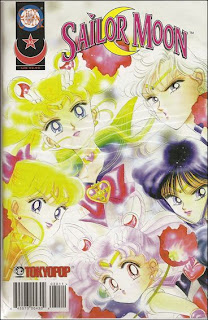Tokyopop Publishing Folds: Why did it happen?
What went wrong?
 |
| One of my favorite Manga of all time |
Tokyopop built a strong brand in the manga boom based on great licenses, a low price point, and its ubiquity and prominence in bookstores. Eventually the company started branching out into other projects like "American Manga" or Original English Language Manga. While it isn't a bad idea in to grow and develop talented American artists, the problem was that there was issues with the artists. This led a variety of talented artists to jump ship before the market for American Manga can foster and develop. They also branched out into social media and legal online scans, the problem was that they never developed these tools to reach out to the market. Tokyopop never had an issue to come up with these great ideas, the problem was that they never developed them to their full potential.
When coming up with a strategy, there is a flow that should happen:
- Brainstorming and coming up with new ideas
- Budgeting and determining feasibility
- Developing it into an actionable item
- Implementing the plan
- Build a proper consumer base
- Use that consumer base to get feedback
- Make the appropriate fixes
 An Increase in Competition:
An Increase in Competition: When Tokyopop first entered the market as Mixx, there were only two major manga competitors, Dark Horse and Viz Media. As manga became popular, the number of competition has increased. Competition affects the manga industry by fragmenting a small market and spreading money around. It also increased the cost of licensing a manga since a Japanese company can go between American Publishers and have them engage in bidding wars to get the maximum amount of money. Competition is great, but once competitors arrived with large advantages, it became hard for Tokyopop to develop an appropriate niche to focus in. Viz has the advantage of being jointly owned by Shuiesha and Shogakukan. Yen Press is a subsidiary of the Hachette Book Group which gives them lots of leverage and power. Kodansha is a huge Japanese Publisher that only recently started to publish its own manga, even buying up Vertical manga in the USA. With this "big three" of the manga industry, it leaves little room for companies like Tokyopop, CMX, Studio Ironcat, and ADV Manga.
Losing a large licensor:
Tokyopop got big by licensing lots of manga from Kodansha. In Japan, Kodansha is the largest publisher of manga. They are the publisher of extremely popular manga anthologies like Nakayoshi, Afternoon, Evening, Weekly Shonen Magazine, and Kiss. Kodansha started to transition away from Tokyopop by releasing most of their manga through the Del Rey imprint. In 2009 Tokyopop has confirmed that Kodansha have been letting their licenses expire [1]. Later on that year, Kodansha confirms that they are now publishing their own manga in the USA [2]. Losing their licenses of the largest manga company in the world was a huge blow to Tokyopop. Kodansha, once their former partner is now one of their biggest rivals, announcing Sailor V and Sailor Moon as its opening salvo, a guaranteed million seller in the USA [3].
The Shrinking Manga Market:
With the economy the way it is, people are tightening their belts and it is having a strong effect on the market. The manga market increased from $50 million before the manga boom to peak in 2007 with a market size of $210 million. Since 2007, the manga market has been shrinking on average by 20%, with the 2010 market estimated at only $112 million. To put this in perspective, when the Manga Boom occurred in 2003, the manga market was estimated to be at $100 million [4]. This means that the manga market has receded so much in the United States that it is almost the size of what it was when it started getting popular in the United States. In a list of the top 750 sales for 2010 in bookscan, manga has 436 spots, selling a total of 3,117,019 units. For reference, the high point was 2007, where manga had 575 spots, selling a total of 6,837,355 units. According to bookscan, manga now is actually lower than it was in the Manga Boom of 2003 where it sold 3,361,966 units. Bookscan actually has a more shocking metric, which will put the manga market in perspective:
Manga Sales in 2007:
- Viz Media: 2018 titles released, 6,249,324 units sold, $55.1 million dollars, $27,315 per title
- Tokyopop: 1992 titles released, 3,073,193 units sold, $30.4 million dollars, $15,274 per title
- Viz Media: 3088 titles released, 3,576,671 units sold, $35.0 million dollars, $11,347 per title
- Tokyopop: 2399 titles released, 834,776 units sold, $9.0 million dollars, $3,765 per title
- Yen Press: 344 titles release, 560,983 units sold, $6.6 million dollars, $19,333 per title [5]
Those numbers should put everything into perspective. Tokyopop's sales have eroded by an incredible margin and the sales per title is horrendous compared to Viz Media and Yen Press. It was unsustainable and Tokyopop would have had to eventually leave the manga market at some point unless they can get sales up. Just look at Tokyopop, they sold 2,399 titles and sold only 834,776 copies. That is a pitiful average of 348 copies of every volume sold. It is completely unsustainable. The declining sales of manga is hitting everyone hard, but Tokyopop took the brunt of it in 2010.
Conclusion:
It is a pity that Tokyopop folded, they introduced manga to a new generation of fans and shows that there is a sustainable market of fans who are devoted to the hobby. The lack of focus made them move into a variety of projects, but never fully develop them. The increase in competition made them get a smaller piece of the market, while increasing licensing costs. Losing Kodansha was a huge blow, especially since Kodansha has opened up an American Branch and is seriously planning to take over the Manga Market in the United States. The biggest blow is the shrinking American market, which has affected Tokyopop the strongest. Tokyopop was an innovator in the field and it is sad to see them go, but when you analyze the situation, they were bound to leave the market.
Sources:
1. Anonymous, "Tokyopop Confirms Its Kodansha Manga Licenses Have Ended." Anime News Network. Retrieved April 15, 2011 <
http://www.animenewsnetwork.com/news/2009-08-31/tokyopop-confirms-its-kodansha-manga-licenses-will-end>
2. Anonymous, "Kodansha Confirms Plans to Publish Manga in U.S." Anime News Network. Retrieved April 15, 2011. <http://www.animenewsnetwork.com/news/2009-10-05/kodansha-confirms-plans-to-publish-manga-in-u.s>
3. Anonymous, "Kodansha USA to Publish Sailor Moon, Sailor V Manga." Anime News Network. Retrieved April 15, 2011. <http://www.animenewsnetwork.com/news/2011-03-18/kodansha-usa-to-publish-sailor-v-sailor-moon-manga>
4. Anonymous, "America's 2009 Anime Market Pegged at US$2.741 Billion." Anime News Network. Retrieved April 15, 2011. <http://www.animenewsnetwork.com/news/2011-04-15/america-2009-anime-market-pegged-at-us$2.741-billion>
5. Brian Hibbs, "Looking at Bookscan: 2010" Comic Book Resources. Retrieved April 15, 2011. <http://www.comicbookresources.com/?page=article&id=30752>
 |
| My copy of the old MIXX Sailor Mars Guid |
 |
| Maria Holic, a Franchise that will be in licensing limbo until it gets picked up |
 |
| Sailor Moon, an early hit for Tokyopop |
 |
| With the Sailor Moon License, Kodansha is poised to jump into the USA market |
 |
| K-On is licensed by Yen Press, a company poised to be a force in the American Manga market. |







Comments
Tokyopop made a series of mistakes. They focused on EOL manga and Manwha that wasn't quite up to par with the Japanese manga they had been releasing. Some of the Japanese titles they did release at this time weren't overly popular. From what I saw the non-Japanese manga didn't really take off as they anticipated. By that time other companies had capitalized on the good Japanese series. At this point TP began canceling series that weren't popular. This is where fans began to lose faith and back away from TP products. They released a slew of less than stellar manga and then they canceled some of the series that people might have been interested in. I know I personally was hesitant about buying anything from TP because you never knew if it would get canceled.